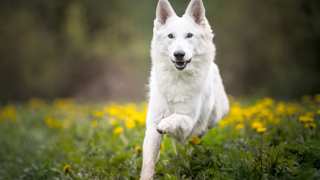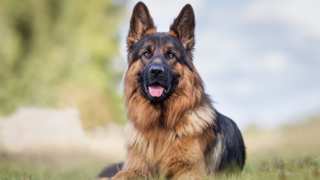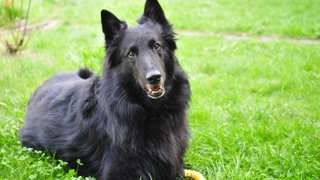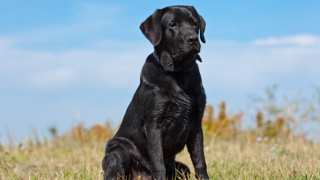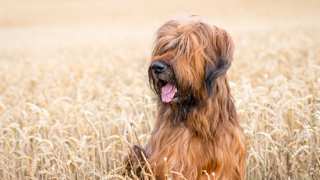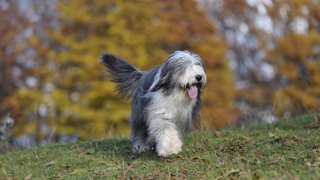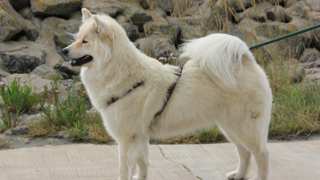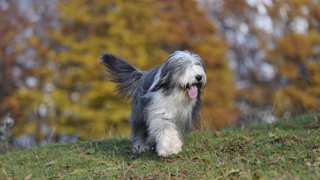The Golden Retriever is an all-around fantastic pet: affectionate, athletic, intelligent, and sociable. Part of its appeal is that Golden Retriever care doesn't take a lot of work. Below you'll find plenty of info on raising Golden Retrievers from puppies to adulthood, including details on development and exercise needs, Golden Retriever maintenance, feeding, and ideal living environments. To learn all about how to take care of a Golden Retriever, read on!
Golden Retriever Exercise Needs
Dogs of this breed are energetic, athletic, and full of stamina, so Golden Retriever exercise needs are pretty considerable. Breed members can begin exercising for short periods as early as three months of age, and by one year they'll need an hour or more per day. Specifically how much exercise does a Golden Retriever puppy need daily? Follow the 5-Minute Rule: from age three months to one year, give your Golden five minutes of exercise for each month it's been alive. (3 months = 15 minutes, 9 months = 45 minutes, and so on.) From one year on, give the dog at least an hour.
Be aware, though, that with its stamina and "people-pleasing" traits, a Golden may not know when to quit! It'll be up to you, the owner, to be sure not to over-exercise the dog (especially during puppyhood, as doing so can injure its still-growing bones and joints). But try and find a balance, as an under-exercised Golden Retriever can be a hyperactive, misbehaving nightmare. This breed is also highly prone to obesity, so a Golden will quickly become overweight without enough physical activity.
EXERCISES FOR GOLDEN RETRIEVERS:
- Walking/Jogging: Good for both the dog and you
- Swimming: Goldens love the water
- Treadmill: Good for bad-weather days; may take a bit of training, but a Golden is intelligent enough to learn how
- Fetch/Frisbee: A Golden will chase a ball, stick, or Frisbee for hours
- Tug-of-War: Can be done indoors or out
- Hiking: Good for bonding and exploring with your Golden
In addition to these daily exercise sessions, it'll be good to also have a ball or chew toy lying around the house; your Golden can use these to burn off pent-up energy. And it's good to have a daily exercise schedule if possible, such as two or three shorter play periods during the day followed by a prolonged exercise session after dinner.
Golden Retriever Maintenance
Maintenance for this breed, in terms of shedding and drooling, is a moderate issue. Golden Retriever shedding is a constant problem (especially during the twice-yearly shedding seasons), but the breed doesn't drool a great deal.
But just how much does a Golden Retriever shed? For most of the year, only moderately, as in finding a few hairs on clothes and furniture. But come spring and fall, when they lose their winter and summer coats, they shed like crazy. Fortunately, these moulting periods only last 2-3 weeks, but be prepared to use the vacuum and lint rollers often during this time. One way to minimize the shedding is to brush your Golden 3-4 times per week, and give the dog monthly baths, for most of the year; during shedding season brush daily, and bathe the dog during the midst of the shedding period (and again at the end, if desired).
In regards to drooling, a typical Golden may drip saliva just before eating, but not much otherwise. One exception, according to breed enthusiasts, is when the dog's owners eat something appealing to the dog (especially "loud"-smelling foods like bacon). They will drool excessively, and will often beg for a bite--but canine experts highly advise against feeding these dogs human food from the table, as it both encourages more begging and contributes to the dog's obesity.
As active, relatively large dogs, it's obvious that Golden Retrievers love food. And what do Golden Retrievers eat? Nearly anything that's edible! It's highly recommended that owners monitor their Goldens' caloric intake (which for mature dogs, should be about 1,700 calories, or roughly 3.5 cups of food, per day; puppies should receive about half that).
For the first four months or so of a Golden puppy's life, it should be fed three times per day, and only twice a day thereafter; meal times can correspond to your own breakfast, lunch, and dinner. And most breed enthusiasts recommend feeding dry kibble (such as Royal Canin) to a Golden Retriever, though some owners choose canned food (either mixed in with the kibble or on its own). Refer to this Golden Retriever feeding chart for more info:
Golden Retriever Feeding ChartDog AgeDog WeightFood TypeAmountFrequency6 Weeks8 lbsDry0.3 cups3x/day12 Weeks20 lbsDry0.4 cups3x/day6 Months45 lbsDry0.75 cups2x/day1 Year55 lbsDry1.5 cups2x/day2 Years65 lbsDry1.75 cups2x/dayUnfortunately, a fat Golden Retriever is an all-too-common sight. These dogs can become obese very easily, which will lead to breathing, circulation, and joint problems, as well as a reduced lifespan. If you believe your Golden is becoming overweight, simply run your hand along its side; if you can easily feel the ribs, it's diet time. And losing weight for dogs is the same as for humans: eat less, move more! Reduce your Golden Retriever's dog food intake by a fourth, and increase its exercise (adding one prolonged exercise session per day is a great idea).
Recommended Food for Golden Retriever
A majority of owners and breed enthusiasts agree that the best dog food for Golden Retrievers (puppies and adults alike) is dry kibble. Not only is it cheaper and more convenient, they say, but provides more balanced nutrition and minimizes the likelihood of the dog becoming overweight. Even so, some still feed their Goldens canned food, often mixed in with the kibble, for at least one meal a day.
Ideally, a dog of this breed will live in a home with a medium- to large-sized yard. A Golden Retriever in an apartment is okay, but the dog will need a great deal of outdoor exercise--and apartment owners may find themselves cramped for space with this big, active breed in the mix. Goldens also adapt to both hot and cold weather, but are uncomfortable in temperature extremes. Overall, as sociable, energetic dogs, Golden Retrievers are best as both indoor and outdoor pets.

